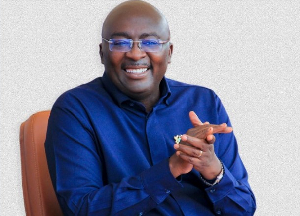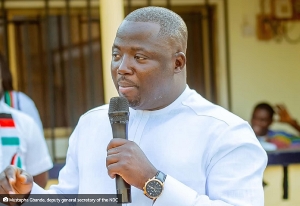As the curtains slowly fall on the New Patriotic Party’s (NPP) eight-year tenure, the party, led by Dr. Mahamudu Bawumia, has taken a worrisome turn in its political strategy. Facing increasing scrutiny over unfulfilled promises, unbearable cost of living, unbridled corruption, unprecedented borrowing, and the free fall in the value of the cedi, the NPP is struggling to carve out a campaign message that will resonate with the electorate in the December 2024 elections.
Therefore, it appears to be embracing ethno-religious manipulation, using Dr. Bawumia's Muslim background and his running mate's tribal ties to fuel support among targeted groups. However, such divisive tactics pose significant risks to Ghana’s unity and stability. Ethno-religious politicking is an incendiary form of campaign strategy that, if unchecked, could drag Ghana down a path of dysfunction and disunity.
Ethno-Religious Campaigning: A Desperate Move
Dr. Bawumia’s campaign increasingly relies on an appeal to religious identity, seeking to cast him as a champion for Muslims in Ghana even as he hops from one church to another. Meanwhile, his running mate widely viewed as having thrived on tribal affiliations throughout his career is positioned to capture the loyalty of a specific ethnic group, the Ashantis. These tactics are not only regressive but dangerously exploit ethnic and religious identities, with an underlying message that divides Ghanaians rather than unites them under a common vision.
Furthermore, after eight years in power, the NPP should be showcasing its achievements and concrete results to the electorate, providing a foundation for why it deserves a continued mandate. Instead, the approach is focused more on promises for the future than a defense of their record, reflecting a critical failure of the NPP as a governing entity.
This shift in tone indicates a disconnect between the party's governance and the reality on the ground, leading to a campaign-style that resembles opposition rather than incumbency. This signals failure, as voters are left questioning what the NPP has achieved during its tenure with a record revenue inflow from three oil fields and unprecedented levels of borrowing.
Undermining National Unity and Development
Ghana’s progress as a democracy depends on its ability to foster inclusivity, where leaders are chosen based on competence, integrity, and a vision for national development rather than on ethnic or religious identity. By emphasizing these factors, leaders can avoid divisive loyalties that hamper cooperation and create factions. A campaign steeped in ethno-religious appeals undermines this ideal and shifts the focus from critical issues such as economic development, security, and education to a superficial allegiance to ethnicity or religion. Such politics breed mistrust, alienate citizens from diverse backgrounds and distract the nation from progress.
Potential for Dysfunctional Conflicts
When politicians rely on religion and ethnicity to garner support, they inadvertently prime the public for a zero-sum approach to governance. Citizens are more likely to perceive the electoral outcome as a win or loss for their religious or ethnic group, fostering resentment and making collaboration across communities difficult. This resentment could escalate into dysfunctional conflicts, hindering Ghana’s developmental agenda and undermining the very essence of democracy. The nation’s resources, instead of being directed towards development projects, could be redirected towards managing and containing conflicts.
A Call for Responsible Campaigning
In light of these dangers, it is imperative for leaders and their supporters to prioritize Ghana’s unity over personal or partisan gain. The call for responsible, issue-focused campaigning is more critical than ever. Ghanaians should demand that politicians outline clear and realistic plans for addressing the nation’s pressing issues and reject leaders who attempt to manipulate identity politics. Politicians, regardless of their party affiliation, should remember that their mandate is to serve all citizens equally and to promote policies that benefit the entire nation.
Conclusion
The divisive campaign strategy of Dr. Bawumia and his running mate is a grave misstep that could harm Ghana’s cherished unity. Ghanaians have an opportunity to reject this dangerous brand of ethno-religious politicking by demanding leaders who foster unity and address national issues with integrity. Let us remain vigilant against attempts to divide us, remembering that Ghana’s strength lies in its diversity and shared commitment to a prosperous, inclusive future. Only by rejecting divisive narratives can Ghana continue to progress as a beacon of peace and democracy in Africa.
Opinions of Tuesday, 22 October 2024
Columnist: Cletus Siebune















